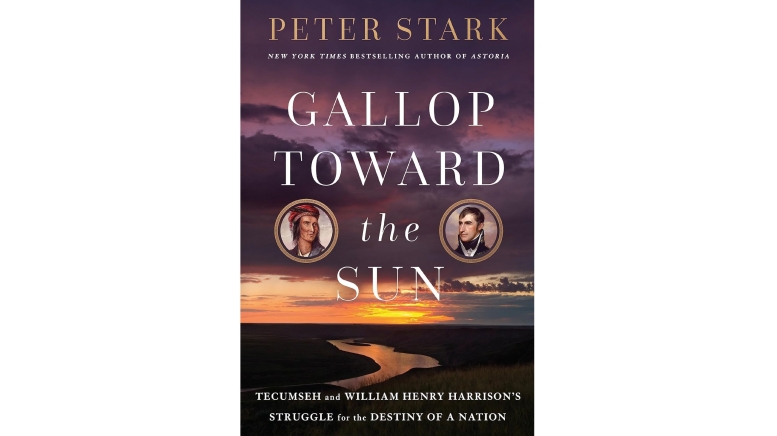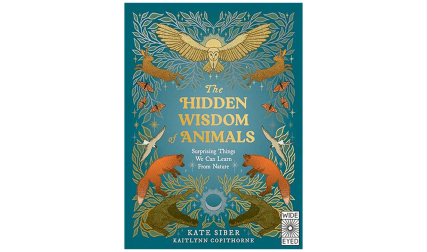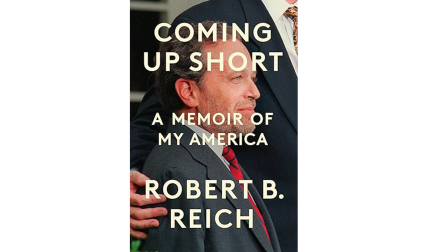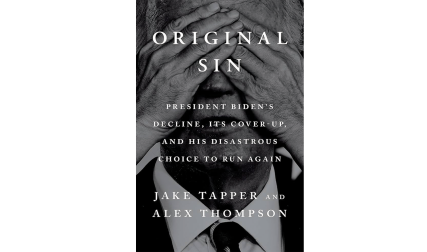On a hot Wednesday afternoon in August 1810, Shawnee chief Tecumseh and his entourage of forty tribal chiefs swung their birchbark canoes toward the Wabash River’s shore. Having paddled for two hundred miles among forests and prairies, they stepped with moccasined feet into a panorama of white gentility—the front lawn of the Indiana Territory’s finest home, Grouseland, fronted by a pillared portico designed in the Virginia plantation style.
At this mansion-in-the-wilderness built by territorial governor William Henry Harrison, Tecumseh and his fellow chiefs intended to discuss treaty disputes. The meeting with Harrison, however, would soon escalate into an angry confrontation over contrary visions for North America’s future, two diametrically opposed ways of life. In an atmosphere heavy with symbolism, the fate of much of the continent would be left hanging in the balance.
Approaching Grouseland from his canoe, Tecumseh spotted a row of chairs carefully arranged on the grass near the redbrick mansion’s portico. A new rail fence separated the lawn and chairs from the bank of the smooth-flowing river. He hesitated.
Watching from the portico, Harrison noticed Tecumseh pause. He dispatched Joseph Barron, his Shawnee-speaking interpreter, to summon the Native contingent forward. Tecumseh refused, indicating an open grove of walnut trees along the riverbank about one hundred yards from Grouseland’s heavy front door. Granting the request, Harrison ordered the chairs and benches moved into the walnut grove.
A council fire was kindled to open the conference. Tecumseh’s party— their faces painted red, black, and yellow, their heads plucked bald but for a warrior’s topknot adorned with feathers—entered the circle, having left their firearms outside by prior agreement, although they still carried tomahawks, knives, and war clubs tucked into their belts. Twelve U.S. soldiers armed with muskets provided the guard for Governor Harrison and the other U.S. officials gathering near the council fire. Knowing from experience the discomfort of a soldier’s uniform in hot weather, Harrison directed the lieutenant in charge to move the troops into the cool shade of a walnut tree.
The territory’s judges and officers took their seats in the row of chairs serving as a dais. An armchair for Governor Harrison stood at its center. The warriors sat on the ground in a half circle, but Harrison offered Tecumseh a chair on the dais, alongside the other distinguished guests.
“It is the wish of the Great Father, the President of the United States, that you do so,” said Governor Harrison who, many years in the future, would become that “great father” himself—the ninth U.S. president.
Tecumseh, witnesses reported, stood still. He gazed at the governor, briefly. Then he looked up and reached with his arm toward the sky.
“My father?” he replied dismissively. “The sun is my father—the earth is my mother—and on her bosom I will recline.”
The effect was “electrical,” reported witnesses. “For some moments, there was a perfect silence.”
Although Tecumseh and Harrison had faced off at a distance during the Battle of Fallen Timbers, sixteen years earlier, they’d never spoken. Since that conflict, which had opened the land that is now Ohio to white settlers, each had risen to high command. Now in his early forties, Tecumseh had emerged as the powerful and persuasive leader of a movement unifying tribes across the continent’s center—spanning from Lake Superior in the North to the Gulf of Mexico in the South, and from the Appalachians in the East to far out on the Great Plains in the West. Harrison, now in his midthirties, governed the sprawling Indiana Territory—a quarter-million square miles of land east of the Mississippi River. Encompassing an area the size of France, it was inhabited primarily by Indigenous people.
Each man single-mindedly strove to defend or impose his radically different vision on the heart of North America. This clash of competing imaginations had reached a pivotal moment. It could tilt toward Harrison’s vision—a second wave of America’s founding that rolled unstoppably westward by handing out cheap, abundant land to the small farmer, a step toward a truer democracy by giving the little guy the vote, but coming at the expense of Native American tribes.
Or it could pivot toward Tecumseh’s vision—blossoming into a powerful tribal alliance that Tecumseh and his brother the Prophet had promised to their thousands of followers across the continent. Holding the land as one, the tribal confederacy would refuse to cede more territory to the U.S. government. Tecumseh’s vision offered the Indigenous leadership its last, best hope to repel a relentless white onslaught bent on engulfing their ancestral lands and tearing up their ancestral cultures by the roots.
Wearing a dress uniform, with his officer’s sword dangling at his side, Governor Harrison opened the council with an acknowledgment of Tecumseh’s complaints and an offer to make amends. Two great warriors such as Tecumseh and himself, Harrison said, should be able to speak to each other frankly “under a clear sky, and in an open path.” He sat down in his armchair as Tecumseh stood.
“Brother! I wish you to listen to me well,” the Shawnee chief began in a clear strong voice. “I wish to reply to you more explicitly, as I think you do not clearly understand what I before said to you. I shall explain it again.”*
He moved gracefully about the council circle in moccasins embroidered with porcupine quills and a fringed shirt and leggings of softened deerskin.
“You have taken our lands from us, and I do not see how we can remain at peace with you if you continue to do so.”
As he detailed the tribes’ complaints, the men were silent except for occasional sounds of assent from the gathered warriors. He concluded with both a plea and a warning. He asked Harrison to “take pity on all the red people.” He warned that if white settlement continued to cross the boundary onto the lands in question, it will “produce great troubles among us.” They didn’t want war, Tecumseh insisted. But they were prepared to go to war if necessary.
He looked directly at Governor Harrison. “I wish you, Brother, to consider everything I have said is true.” Then he sat down on the earth.
Rising from his armchair, Harrison justified his conduct, according to eyewitness accounts. There was “no foundation in fact” for the charges of “bad faith” made against the government. The governor could personally say in the presence of the Great Spirit that his own conduct “had been marked with kindness, and all his acts governed by honor, integrity and fair dealing.” He had always been a friend of the red man.
Tecumseh’s assertions marked the first time in the governor’s life that “his motives had been questioned” by any chief who cared about the truth.
Harrison returned to his chair, and Barron translated the governor’s words from English into Shawnee. He had turned to the Miami and Potawatomi leaders to translate into their languages, when Tecumseh, sitting in the council circle, called out in Shawnee: “Tell him HE LIES!”
The warriors began to stir.
Barron hesitated. He didn’t want to offend Harrison and his visiting officials. He softened Tecumseh’s words when he translated them into English, and delivered them to the officials with an apologetic tone.
But Tecumseh understood some English. Again, he angrily burst out at Barron in Shawnee. “No, no,” Tecumseh insisted. “TELL HIM HE LIES.”
*Nations and tribes of eastern North America often framed their connections with one another in terms of family relationships, such as uncle, brother, or grandfather. These were terms of respect. When the French first arrived in North America, they adopted the role of a “father” who was expected to take care of his “children” by giving gifts and other privileges. A ceremonial term, “father” was then used by tribes to address the British and American powers who claimed North American lands and a patron relationship to the Indigenous people. In his opening words to Harrison, Tecumseh notably dismissed the notion that the U.S. president was his “Great Father.”
Excerpted from Gallop Toward the Sun by Peter Stark. Copyright © 2023 by Peter Stark. Excerpted by permission of Random House. All rights reserved. No part of this excerpt may be reproduced or reprinted without permission in writing from the publisher.




